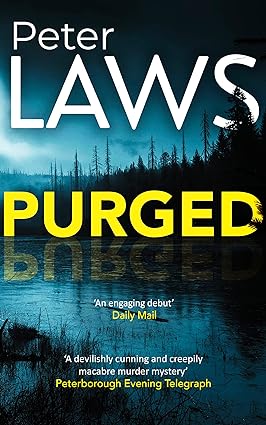Purged (2017) is the first in Peter Laws’ Matter Hunter series of novels. Matt had been a minister but lost his faith, and is now lecturing on the sociology of religion. He is happily married to Wren and they have a daughter, Lucy, plus Wren’s daughter by an abusive ex-husband, Amelia, a stereotypically unpleasant-on-the-surface-but vulnerable-underneath teenager. Matt is still struggling to come to terms with the horrific murder of his mother at the hands of someone to whom she had provided a home. Occasionally he lends a hand to the police when they have a religion-related problem requiring specialist knowledge.
Wren is an architect working in a partnership, but her position is precarious and she desperately needs a new commission. Out of the blue the family is invited to the village of Hobbs Hill, home of the country’s loudest waterfall, so she can be interviewed over an extended period for a prestigious project remodelling the church. They scoop up the kids and leave the unpleasant street in which they live, heading to rural Oxfordshire. What follows is pretty much what one would expect in such novels when a family leaves the city and heads to the countryside: not a happy experience.
They find Hobbs Hill is dominated by the local evangelical church, a community that as a result has turned in on itself. To Matt’s surprise and discomfort he finds the charismatic pastor, Chris Kelly, is someone he knew at theological college, but who left in mysterious circumstances after his wife died. He wonders if this is all about Wren getting a job, or Kelly’s attempt to draw him back into the faith. Matt has to uphold his principles but not cause offence, while his old colleague spars with him and puts him constantly on the defensive. If Wren is to be selected, he needs to toe the line and get on with the book he is supposed to be writing.
Then the situation takes a sinister turn. A girl is missing, and a picture is texted to Matt before disappearing from his screen. He reports the incident and finds himself involved with the police again, but this time is it to help, or as a suspect? Then there are further deaths. It looks like the Hunters arrived at the wrong time. Meanwhile, menacing events suggest Matt’s family is at risk, while his stepdaughter becomes increasingly interested in the church, not something he would wish to encourage. Matt finds he needs to unravel the mystery as much for his and his family’s sake as for justice.
This is a crime novel with horror elements connected to the various deaths (Laws writes a monthly column on horror films for Fortean Times so is knowledgeable on the subject). It also taps into a general suspicion of evangelical cultism, affable on the outside with intolerance not far beneath, and intent on controlling its adherents. Laws is an ordained minister himself, so is naturally strong on the theological details. But I was left wondering if the aspects addressing Matt’s loss of faith were autobiographical, as Laws does a lot of writing but doesn’t appear to emphasise any clerical activities he undertakes.
On the other hand, although by the end most readers will have decided Hobbs Hill is not for them, even without the murders, for all Matt’s secular arguments it is uncertain whether he has the answers to life’s mysteries either. At the beginning of the novel he is called in to deal with what appears to be a case of possession. He handles the matter with aplomb and feels he has done a good job, but at the conclusion he learns there was a tragic aftermath, which forces him to question his approach. Can we assume the Devil is superstitious nonsense? What is the best way to live when there may be supernatural forces we only glimpse? Even if Kelly’s brand of Christianity is not the solution, and taking religious doctrine to extremes can lead to bizarre conclusions, there is an implication that perhaps the Church in its more liberal form still has a role in modern life.

